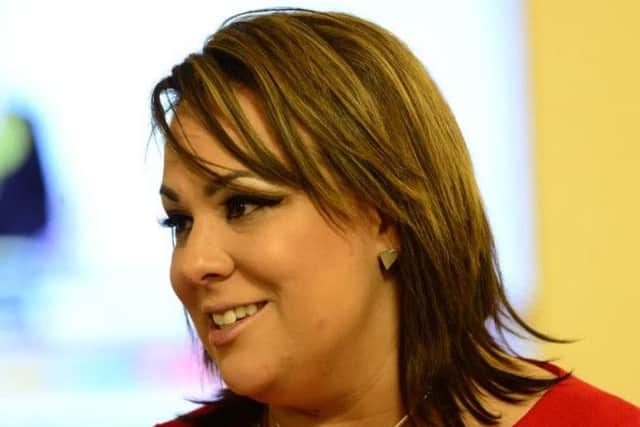Hospitals '˜struggling to meet demands' amid staffing crisis


Figures obtained from 13 of Yorkshire’s hospital trusts show they spent a combined £171m on agency doctors and nurses in 2015/16 - up from £12.8m in 2014/15 and up more than 56 per cent on 2013/14’s £11.8m.
One regional MP, whose local health trust spent more than any other in Yorkshire on agency doctors and nurses last year, said our hospitals are struggling to cope as the Government makes it more difficult for trusts to recruit permanent staff.
Advertisement
Hide AdAdvertisement
Hide AdLabour’s MP for Dewsbury and Mirfield Paula Sherriff, who sits on the Health Select Committee, has previously asked for the intervention of health secretary Jeremy Hunt at Mid Yorkshire’s Hospitals NHS Trust, which spent almost £25m on agency doctors and nurses last year, a rise of 59 per cent on two years earlier. The trust also breached the agency staff spending cap more than any other trust in Yorkshire from November to May - 23,540 times.


“The fact that the agency spend as a whole, both in West Yorkshire and across the rest of the country, is at such a high level is indicative that all of our hospitals are struggling to meet current demands and yet the government is still failing to deal with this growing problem,” Ms Sherriff said.
“This will only be further exacerbated by the Government’s prevarication on whether EU nationals can remain in the UK following the Brexit decision and the Government decision to end bursaries for nursing and other healthcare qualifications.
“Both of these factors will make it difficult for hospitals to recruit permanent, qualified staff.”
Advertisement
Hide AdAdvertisement
Hide AdDavid Melia, director of nursing and quality at Mid Yorkshire, acknowledged that there “is still a way to go” to tackle the issue, but said the trust is looking at ways to reduce its “overall reliance” on agency workers.


“There’s no doubt that these additional staff members are a valuable resource to the NHS but we need to do all we can to attract more permanent clinical staff into the organisation,” he added.
Calderdale and Huddersfield NHS Trust, which has come under fire over plans to close the A&E department at Huddersfield Royal Infirmary and send patients to Halifax, saw a 71 per cent increase in spending from £9.8m in 2013/14 to £16.9m in 2015/16.
Chief operating officer Helen Barker said it’s priority is providing “safe, high quality, compassionate care” and to do this “we need to ensure that we maintain appropriate nursing and medical staffing levels”.
Advertisement
Hide AdAdvertisement
Hide AdThe investigation also revealed that some hospital trusts were failing to prepare for staffing crises by vastly underestimating agency spending budgets.
Doncaster and Bassetlaw trust and Sheffield Children’s Hospitals both saw the biggest discrepancies between budgeted figures and actual spend last year.
Doncaster spent over £18m, compared with the budgeted £1.4m - an increase of 1143 per cent; and Sheffield Children’s spent £2.6m compared with a budgeted £213,000 - an increase of 1114 per cent.
Doncaster said it budgeted “on the assumption” that all essential posts would be filled with permanent staff, while funding for agency posts always comes from the unspent budget that has been set aside for the permanent posts.
Advertisement
Hide AdAdvertisement
Hide AdA spokesperson for Sheffield Children’s Hospital overall staff expenditure was “broadly in line” with budget and it was building an internal bank of staff to cover temporary staffing gaps give the trust “extra resilience”.
Rotherham NHS Foundation Trust spent £12.4m last year - up a fifth on the previous year and almost double that of 2013/14 when it spent £6.3m. Last year’s expenditure was also 400 per cent more than the budgeted £2.5m.
Director of workforce at the trust, Cheryl Clements, said it was committed to having the right number of staff on duty “at all times” to ensure safe standards of care to patients. Agency staff were used to fill gaps due to vacancies, national shortages and unplanned absences.
Leeds Teaching Hospitals was the only Yorkshire trust to report a nominal drop in spending on agency doctors and nurses from 2014/15 to 2015/16 - a decrease of 4.3 per cent from £23.7m to £22.7m.
Advertisement
Hide AdAdvertisement
Hide AdHowever, last year’s expenditure was 134 per cent more than the budgeted £9.7m.
Chief nurse Suzanne Hinchliffe said it committed £13.5m to increase the number of nurses working on wards in April 2014. Furthermore, despite a shortage of candidates it had recruited an extra 48 band 5 nurses, midwives and theatre practitioners into permanent posts since April 2016, with another 411 in the pipeline.
She added: “We continue to work with local universities and use innovative recruitment campaigns to attract more nurses to the Trust and show Leeds is a great place to develop their career and an exciting city to live and work in.”